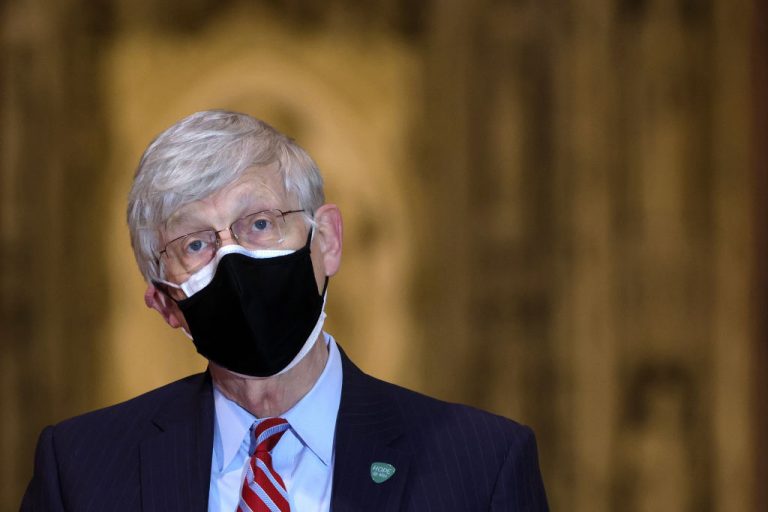Director of the National Institutes of Health (NIH), Francis Collins, resigned suddenly on Oct. 5, less than a month after The Intercept obtained 900 pages of documents in a Freedom of Information Act (FOIA) request confirming the NIH and Anthony Fauci’s National Institute of Allergy and Infectious Diseases (NIAID) funded the Chinese Communist Party’s (CCP) laboratories through Peter Daszak’s EcoHealth Alliance.
In a resignation statement on the NIH website, Collins said “the decision to step down was a difficult one,” adding, “I fundamentally believe, however, that no single person should serve in the position too long, and that it’s time to bring in a new scientist to lead the NIH into the future.”
The statement also lauded Collins achievements in “garner[ing] broad bipartisan Congressional support for NIH research,” noting that “during his 12-year leadership, NIH’s budget grew by 38%, from $30 billion in 2009 to $41.3 billion in 2021.”
The release also excitedly promotes the creation of the Advanced Research Project Agency for Health (ARPA-H), which the NIH describes as, “Modeled after DARPA in the Department of Defense, ARPA-H is envisioned to support and conduct high-risk, high-reward biomedical and health research in a way that is radically different than NIH’s grant-based system.”
In May, Unlimited Hangout warned of a troubling pattern of HARPA, a Trump era proposal to create a health-focused DARPA spinoff, which served as the spiritual predecessor to ARPA-H, to collect biometric data from citizens from wearable devices to use in massive artificial intelligence processing for the purpose of predictive pre-crime law enforcement.
Success
You are now signed up for our newsletter
Success
Check your email to complete sign up
On Sept. 6, The Intercept obtained documents that showed the NIH had funded EcoHealth Alliance with $3.1 million USD, $599,000 of which was given directly to the CCP’s Wuhan Institute of Virology “used in part to identify and alter bat coronaviruses likely to infect humans. Even before the pandemic.”
“Many scientists were concerned about the potential dangers associated with such experiments,” read the article.
On Sept. 9, The Intercept published further information revealing the NIH had funded Daszak’s organization to conduct gain of function research with a second Wuhan Lab, Wuhan University Center for Animal Experiment, this time a Biosecurity Level 3 laboratory, “To study bat coronaviruses combined the genetic material from a ‘parent’ coronavirus known as WIV1 with other viruses.”
“They twice submitted summaries of their work that showed that, when in the lungs of genetically engineered mice, three altered bat coronaviruses at times reproduced far more quickly than the original virus on which they were based. The altered viruses were also somewhat more pathogenic, with one causing the mice to lose significant weight,” said The Intercept.
The article noted the research “included subawards to Wuhan Institute of Virology and East China Normal University.”
In mid-September, National Pulse broke a story revealing the NIH had funded 265 studies with researchers from the CCP’s military, the People’s Liberation Army (PLA), since 2005. The most frequent PLA facility in the batch was the PLA General Hospital in Beijing.
Collins also has a history serving on the Advisory Board for the International Conference on Genomics, a conference connected to China through BGI Genomics, a global genetic data collection company with its own connections to the PLA, and the China National Gene Bank.
In 2011, Collins also joined the NIH with the National Natural Science Foundation of China, an organization that also has research ties to the PLA and serves under the Party’s Ministry of Science and Technology, with a Memorandum of Understanding
On the NIH’s website, a May 19 statement is still posted where the organization claimed that “neither NIH nor NIAID have ever approved any grant that would have supported ‘gain-of-function’ research on coronaviruses that would have increased their transmissibility or lethality for humans.”
On Sept. 10, Collins was paraphrased as telling the Religion News Service in an interview “that he is ‘a bit’ frustrated with fellow evangelicals who have hesitated or refused to get the vaccine,” and that “he hopes the ‘much more muscular requirements’ will make ‘a big difference’ in reducing the number of unvaccinated Americans.”
The former Director also advocated for “evangelicals” to promote vaccine acceptance in their community because “somebody they trust, who’s willing to talk with them, listen to the concerns” were best positioned to debunk the “conspiracies on social media that basically don’t have any truth to them but are troubling if you’ve heard them several times” afflicting the vaccine hesitant.
Collins went one step further when he said, “And that, for somebody who’s a believer, this is what you could call an answer to prayer. If we’ve all been praying to God to somehow deliver us from this terrible pandemic, and what happens is these vaccines get developed that are safe and effective, well, why wouldn’t you want to say, ‘Thank you, God’ and roll up your sleeve?”
















